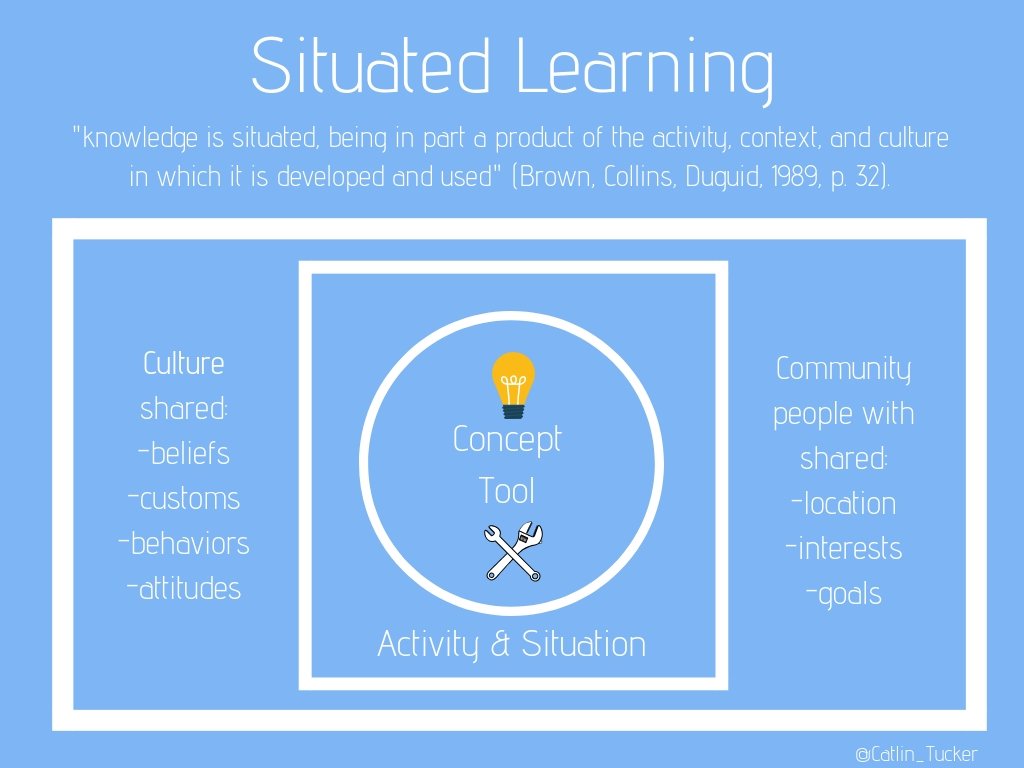Building PD Through Learning Relationships: Situated Learning
Just like students should never stop learning, teachers must also learn new skills and refine their current ones. The world of education is always changing and skipping even a single year can cause a teacher or student to fall behind.
How do teachers acquire new skills?
There are currently two ways in which teachers are taught new skills once they have left their educational program. The first way is the traditional cognitive perspective. The second way is a situated learning perspective. Each of these two perspectives can help a teacher learn new tactics and methods that they can apply to their curriculums and lesson plans. Both of these perspectives are not equally applicable to every type of lesson or subject. The cognitive learning perspective will work better in certain subjects while the situated learning perspective will work better than others. But when they are applied in the right way, both of these perspectives can work together to create an improved structure for the teacher.
Is it theory first, then practice, or vice-versa?
The first issue with many teacher training methods is that the theory comes first and the practice becomes second. However, much of the curriculum that was originally created to educate teachers on how to teach students is developed far from any real-world situation. What we know now is that all types of educational programs must be developed for real-world application. In order to develop an effective process for Teacher educational programs, all of the education must be based on real-world experiences.
What is “Situational Learning Theory?”
Situational learning theory has to do with the experience a teacher develops once they are actively teaching inside their classrooms. However, the traditional cognitive theory deals with the foundations of educational theory. One is not more important than the other. Each theory has its own practical applications, and it is fundamental to the education of students. Situational learning theory has to do with the experiences that happened in the classroom, previous experiences from past classrooms, and how students learn when they're actually in the process of learning. Caitlyn Tucker shares some tips below that will help classrooms transform into learning spaces:
Focus on authentic situations- Always ask how does this relate to students lives
Involve more doing- Thinking of activities that will provide a simulation for student experiences
Problem-based- working on a solution to fix a current issue
Connect learners- Work to partner with practitioners in the field and experiences beyond the classroom
Encourage Conversation- Require conversation, collaboration, and social negotiation.
There are so many ways to support students but we know collaborative learning is the key…
While many educators would rather work with situational perspective theory, it is important to note that this theory is not perfect as it does not take into account the individual differences that students will have or gaps in their knowledge. Each student learns at a different rate and some students will forget certain concepts faster than others. This is why it is important for students to learn together in collaborative groups. Students must participate in activities and in groups as well as engage in mini assessments (Research Gate).
References
Sharing Diigo Links and Resources (weekly) | Another EducatorAl Blog says: & Fekara @ School Management Software says: (n.d.). Reflections on situated learning vs. the traditional school system. Dr Catlin Tucker. Retrieved December 29, 2021, from https://catlintucker.com/2018/10/situated_learning/
(PDF) situated learning theory: The key to effective classroom teaching? ResearchGate. (n.d.). Retrieved December 23, 2021, from https://www.researchgate.net/publication/327530821_Situated_Learning_Theory_The_Key_to_Effective_Classroom_Teaching
Glavin, C. (2014, February 6). Cognitive perspective. Cognitive Perspective | K12 Academics. Retrieved December 25, 2021, from https://www.k12academics.com/educational-psychology/learning-cognition/cognitive-perspective

